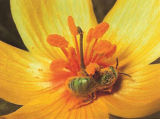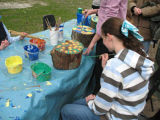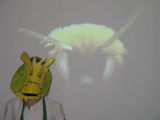workshops
Bee Nest Making Workshop
Suitable for adults and children, and school projects
Encourage bees into your garden, and help increase the yield of your fruit and vegetables.
Solitary bees comprise approximately 74% of our 256 species of UK native bees and are excellent pollinators. Their existence is under threat due to habitat degradation. You can help their survival by making artificial nests, and also enjoy extra yields of fruit and vegetables. Solitary bees lay several eggs in a single hole or tube leaving a ball of pollen next to each egg, and sealing each chamber. The developing larvae eat the pollen as they grow to emerge from the holes as fully-grown bees.
Painting drilled logs and placing them in your garden will help the bees relocate their own nests after foraging.
Please note: solitary bees are non-aggressive
Materials required: seasoned drilled logs; acrylic paint; paint brushes
Bee Mask Making Workshop
Suitable for children and school projects
The workshop is introduced with a brief PowerPoint presentation which by showing the bee head images and drawings from our exhibition, PARTY ON! illustrates the diversity of bees worldwide and their importance as pollinators.
The children have the opportunity to pick a particular bee head image that they like best. By drawing and painting on card, and, subsequently, cutting around the outline they can create their own bee head mask.
The workshop is ideal for children to express themselves artistically, gain a more intimate idea of the myriad colours and diversity of bees, learn of the importance of habitat and species preservation and, in the process, have fun.
Materials required: pencils, crayons, felt-tip pens, light-weight card, scissors, paintbrushes, elastic and staples
Suitable for adults and children, and school projects
Encourage bees into your garden, and help increase the yield of your fruit and vegetables.
Solitary bees comprise approximately 74% of our 256 species of UK native bees and are excellent pollinators. Their existence is under threat due to habitat degradation. You can help their survival by making artificial nests, and also enjoy extra yields of fruit and vegetables. Solitary bees lay several eggs in a single hole or tube leaving a ball of pollen next to each egg, and sealing each chamber. The developing larvae eat the pollen as they grow to emerge from the holes as fully-grown bees.
Painting drilled logs and placing them in your garden will help the bees relocate their own nests after foraging.
Please note: solitary bees are non-aggressive
Materials required: seasoned drilled logs; acrylic paint; paint brushes
Bee Mask Making Workshop
Suitable for children and school projects
The workshop is introduced with a brief PowerPoint presentation which by showing the bee head images and drawings from our exhibition, PARTY ON! illustrates the diversity of bees worldwide and their importance as pollinators.
The children have the opportunity to pick a particular bee head image that they like best. By drawing and painting on card, and, subsequently, cutting around the outline they can create their own bee head mask.
The workshop is ideal for children to express themselves artistically, gain a more intimate idea of the myriad colours and diversity of bees, learn of the importance of habitat and species preservation and, in the process, have fun.
Materials required: pencils, crayons, felt-tip pens, light-weight card, scissors, paintbrushes, elastic and staples


